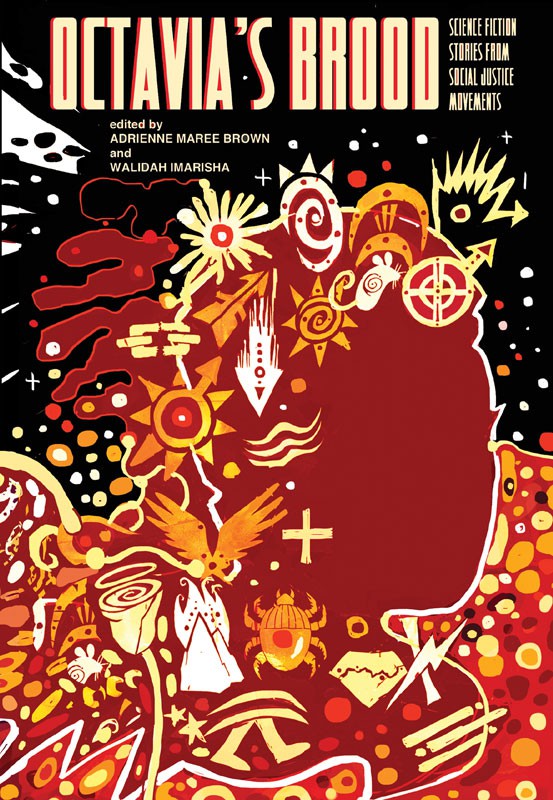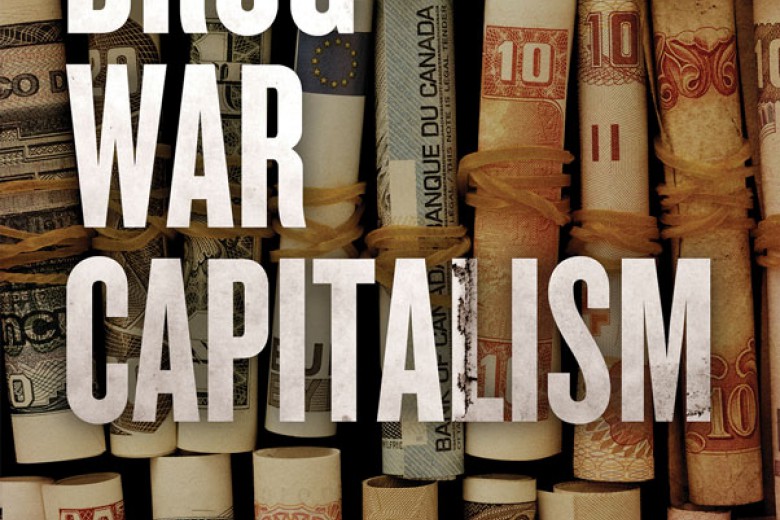
Edited by Walidah Imarisha and adrienne maree brown
AK Press, 2015
In the short story “Revolution Shuffle,” author Bao Phi describes a post-apocalyptic Midwestern internment camp where Arab- and Asian-Americans power huge earth-shaking machines. Outside the camp, zombies claw at the walls, their numbers continually growing. “[Politicians] argued that it would be in the best interest of the ‘targeted communities’ to be guarded in these work camps away from the other survivors,” Phi writes.
“Revolution Shuffle” is one of 25 entries in Octavia’s Brood: Science Fiction Stories from Social Justice Movements, which editors Walidah Imarisha and adrienne maree brown refer to throughout the text as an anthology of “speculative” or “visionary” fiction, rather than strictly sci-fi. In addition to Phi, a Minnesota slam poet, contributors include established fantasy authors such as Sheree Renée Thomas and celebrities like LeVar Burton (Commander Geordi La Forge from Star Trek: The Next Generation), as well as emerging writers and activists, many of whom had never written fiction of any kind. The anthology also includes an essay by political prisoner Mumia Abu-Jamal and an essay on the collection’s namesake, Octavia Butler, by her friend and fellow speculative fiction writer, Tananarive Due. Due provides a working definition of speculative fiction as “science fiction, fantasy, and horror … depicting a world that is not quite our own, and creatures that don’t exist in the world as we know it.”
Social justice is an apt theme for science fiction, so we’re not surprised, for example, that Phi’s zombie apocalypse is also a social commentary on conditions that exist today. However, to ignore the particular ways in which social justice moves through these stories would be to deny that sci-fi has also participated in regimes of oppression. Star Trek certainly isn’t the only franchise to describe space as a “frontier,” a zone waiting to be “discovered” and tamed by Anglo-American men. And, as Abu-Jamal argues in his essay, “Star Wars and the American Imagination,” the success of Star Wars in 1977 can be linked to a need to deny the imperial desire behind the Vietnam War. The impetus and hope of Octavia’s Brood is to use sci-fi not merely to describe social conditions, but to instigate social change. “If we want to bring new worlds into existence,” brown writes, “then we need to challenge the narratives that uphold current power dynamics and patterns.”
Yet, the power in Octavia’s Brood is not in imagining alternative worlds, but in realizing alternative thinking, reconstituting resistance and self-determination as ways of being now, rather than as strategies for a later utopia. Thus, “Revolution Shuffle” ends with revolutionaries descending upon the internment camp to free detainees. In “Evidence,” Alexis Pauline Gumbs evokes the field report form of Doris Lessing’s Shikasta with archives that look back to a historical period described as “during capitalism.” Imarisha’s “Black Angel” imagines a fallen angel who overcomes self-pity to join humans in their struggle. And, in “Small and Bright,” Autumn Brown describes a subterranean civilization that sends insurgents to the surface, presumably to die, though rumours persist that a new civilization has been taking form there.
More than merely a “best of” collection, the anthology is a manual for organizing and resisting colonization – territorial occupation as well as what anti-colonial theorist Frantz Fanon described as internal colonization “created by the death and burial of … local cultural originality.” Fanon’s response, in 1952, was to determine his own potential rather than seek recognition from the colonial state: “I am not a prisoner of history,” he wrote in Black Skin, White Masks. “I shall not seek there for the meaning of my destiny.” Twenty years later, Octavia Butler sought not only meaning but also a sense of futurity in sci-fi. And Imarisha, in turn, hopes to achieve this futurity by “decolonizing the imagination.” She and brown explicitly avoid neutrality in this collection, while tacitly refusing recognition from the Western canon with the same determination that drives the characters in Octavia’s Brood. Notably, brown’s “Outro” also encourages us to “bring the work off the page” through emergent strategies of resistance and self-determination.
The urgency of this work cannot be overrstated: even as scholars work out the ways in which settler colonialism continues to oppress Indigenous peoples, they are also beginning to describe how that same colonial logic has been renewed in post-industrial “dead” zones like brown’s hometown of Detroit. In her horror story “the river,” brown defies the derogatory image of Detroit, imagining a Motown built by the living. “she noticed who stayed,” brown writes, “and it was the same people who had always been there. a little unsure of the future maybe, but too deeply rooted to move anywhere quickly.”






